- Overview
- Trip Outline
- Trip Inclusion
- Trip Exclusion
- Gallery
- Reviews
- Booking
- FAQs
The Trek
Right above Manali, at the meeting point of two high altitude ridges lies the spectacular glacial lake of Bhrigu. Named after Maharshi Bhrigu who has great significance in the Hindu mythology this lake freezes from December to May. Locals however believe that this lake never freezes completely due to its association with the mythology. This trek is a short but famous one - for being in the Pir Panjal range, for forests & beautiful lush green meadows. On this trek, you also view on Hanuman Tibba and Seven Sisters peaks.
The Area
This trek lies in the Kullu valley of Himachal. The Kullu valley is a prime tourist and adventure destination. It’s unparalleled beauty along with easy accessibility has attracted many adventurists. No wonder some call it the Chamonix of India. The language the people speak here is called Kulvi. Apple is the major cash crop and the whole valley turns red in August!
Expected Weather
- Chances of rain/hail - Moderate rainfall can be expected in June
- Snow on trail- Possible in May and November. Temperatures: Afternoon - 20 degrees, Nights
- Around zero degrees at higher camps (June), -8 (November)
Day 1: Arrival in Manali and Trek to Jonker Thatch
- Arrival: Arrive in Manali and freshen up in the provided common room.
- Drive: Drive to Gulaba (1.5 hrs), the starting point of the trek.
- Trek: Begin the trek to Jonker Thatch (3150 mts).
- Distance: 1 km. Time: 30 minutes
- Overnight: Stay overnight in camps at Jonker Thatch.
Day 2: Trek from Jonker Thatch to Rola Khuli
- Trek: Continue the trek from Jonker Thatch to Rola Khuli (3830 mts).
- Distance: 5 kms. Time: 5 hrs
- Overnight: Stay overnight in camps at Rola Khuli.
Day 3: Trek to Bhrigu Lake and Back
- Trek: Hike to Bhrigu Lake (4270 mts) and then return to Rola Khuli.
- Distance: 8 kms. Time: 7 hrs
- Overnight: Stay overnight in camps at Rola Khuli.
Day 4: Trek to Gulaba Road Head and Drive to Manali
- Trek: Trek from Rola Khuli to Gulaba Road Head.
- Distance: 6 kms. Time: 3 hrs
- Drive: Drive back to Manali (1.5 hrs).
- End: The trek ends upon reaching Manali by 2 PM.
- Accommodation: Complete accommodation from Manali to Manali.
- Food: All meals provided during the trek.
- Transportation: Round-trip transportation between Manali and the trek starting point.
- Equipment: Rental of essential common gear such as tents and sleeping bags.
- Permits: Forest entry permit fees.
- Guidance: Services of a professional guide and their expertise.
- Medical First Aid Kit: High altitude first aid kit, stretcher, oxygen cylinder.
- Personal Purchases: Meals or beverages purchased by participants during travel or the trek (e.g., snacks, fruits).
- Personal Gear: Rental fees for personal equipment (refer to the "Things to Carry" section for recommended items).
- Trek Insurance: Optional travel insurance.
- Transportation: Transportation to and from Manali.
- Porterage: Participants can carry their own backpacks. Those unable to do so can opt for a porterage service at ₹350 per day.
- GST: 5% Goods and Services Tax (GST) on applicable items.
Manali is well connected from Delhi/ Chandigarh. You have regular bus service from both Delhi and Chandigarh. The nearest airport is Kullu. One can take a cab from Kullu to Manali which costs approximately 2000 INR. You also get regular bus service from Kullu to Manali. Note, it is advisable to book a cab to avoid inconvenience.
Yes, this is ideal for first timers.
The common perception is that alcohol makes you feel warmer, however it also dehydrates you & dehydration can be fatal while trekking. Hence consumption of alcohol is prohibited. Smoking in camps is not allowed.
We’ve been organizing treks for over five years and have had many female trekkers trek with us. In fact, a lot of them come solo for treks. There has never been a complaint about the atmosphere of a trek, about other trekkers or our professionalism. They have all been kind enough to leave a review.
Wild animals do not frequent camps. They tend to stay away.
You will be sleeping in twos or threes in your tents in sleeping bags. The sleeping bags are snug and comfortable. We will be providing inflatable pillows.
TOILET
In all the camps where the accommodation is in tea houses/ home stays, there will be proper toilets. The toilets are mostly western, in case if they‘re Indian, then we try to provide a toilet seat most of the times.
On the day of camping, we will have toilet tents (with a dry pit toilet), the most hygienic way of answering nature’s call.
A dry pit toilet is an eco-friendly sanitation solution featuring a pit dug into the ground, topped with a toilet seat and a wrought iron stand. Near the toilet, a pile of mud, sand, or coco peat is provided for covering waste after use, facilitating rapid breakdown of fecal matter due to increased microbial activity. This method eliminates the need for water, thereby preventing contamination of nearby water sources, as water toilets are prohibited at campsites.
While toilet paper is available, please use it sparingly to avoid overloading the pit, which can take years to decompose. Please refrain from using wet wipes as they are not bio degradable or use bio-degradable wipes.
Through the trek, there are no bathing facilities at campsites. Trekkers often take advantage of running streams to freshen themselves up.
Tents do not have charging stations. Guests are advised to carry power banks.
Meals will be provided by us. However you may carry snack items to much on like dry fruits, biscuits, chocolates, protein bars, or nuts.
Yes, you are ideally expected to carry your backpack. But you do have an option of offloading your bags on a mule for an additional cost. The cost will be ₹350/ per day per bag. One is expected to inform us about offloading 1 week prior to the trek.
2-3 kms slow jog OR 25 kms cycling. Pace is not important, consistency is important (non-stop jogging/running/cycling)
Squats 20-25 x 3, Lunges 20-25 x 3, Calf raises 20-25 x 3
Climbing stairs 15-20 floors with backpack
If you cancel –
– 60 days before the trip: we can process a complete refund minus minimum processing charges.
– Between 30-45 days before the trip: you will be refunded 50% of the trek fee.
– Within 30 days before trek starts: No refund. – and your spot is replaced in a full batch: we will process a complete refund after canceling minute operational charges.
• Good Sturdy Backpack: Prefer a trekking pack over a backpacking one. The size of the backpack depends upon the participant. Normally for a 5-6 day trek a 40-50 litre pack should suffice.
• Shoes: Any waterproof trek (not hike) shoe would be ideal.
• Socks: 3 pair cottons and 2 pairs of woollens.
• Trek pants (ideally water resistant): They are very important and help you a great deal on your trek. You can get two quick dry summer trek pants. If you don’t have a trek pants, you can replace it with Gym track pants. Don’t trek in Jeans/ Pants.
• T-shirt/ Base layer: One can get 2 T-shirts/ trekking base layer on the trek, one of which can be full sleeved. Avoid cotton and prefer dry fit.
• Fleece/ Sweater/ good quality Hoodie: 1 fleece jacket or sweater. Fleece is preferred over sweater (or hoodie) as it is lightweight and easy to carry. Sweaters and Jackets can be heavier than Fleece for the warmth they offer.
• Down/ Padded Jacket – Down/ Padded jacket (Upto -5 degrees). If you don’t want to get a padded/ down jacket, get two fleeces.
• Cotton track pants for camp – These are specifically for cold evenings at the campsite. This can be ignored if you are comfortable wearing your trekking pants in the camp.
• Thermals: 1 pair. We wear thermals only upon reaching the campsite not while trekking.
• Windproof Jacket: All rain proof can be used as wind proofs. Required as an additional layer during trekking in windy conditions. Avoid if you have a rain proof jacket.
• Rainwear:
• Option 1 – Rain set: One Waterproof jacket (3000 mm waterproofing), Rain proof pants and Bag cover
• Option 2 – Poncho: Covers your body and bag completely.
We recommend Option 1 as poncho makes trekking difficult.
• Woolen Cap/ Balaclava-1: To cover your ears, head and neck. Get one woollen cap and one neck warmer or balaclava.
• Neck Warmer/ Scarf - 1: For evenings. Avoid if you are comfortable using a Balaclava.
• Gloves: 2 gloves out of which 1 can be waterproof and one woollen. The waterproof one has to ideally be larger than you normally use so that you can wear both your gloves together if required.
• Suncap – 1
• Sunglasses – 1
• Toiletries – Also include sunscreen, moisturizer and lip-cream
• Headlamp/ Torch -1. Preferably head lamp.
• Trekking pole
• 2 water bottles (1 litre each) – One can also get a hydration pack.
• Camp shoes/ Flip flops for camp
• Plastic covers for inside the backpack to keep your clothes dry
• Daypack – Required if you have a summit days climb. Preferably one that can be compressed.
• Documents: 2 passport sized photograph, Address and Photo proof (Driving License or Aadhaar card), Doctor’s medical certificate saying that you are fit for the trek. We reserve the right to not take you on the trek if you fail to produce this.
• Trekking pole
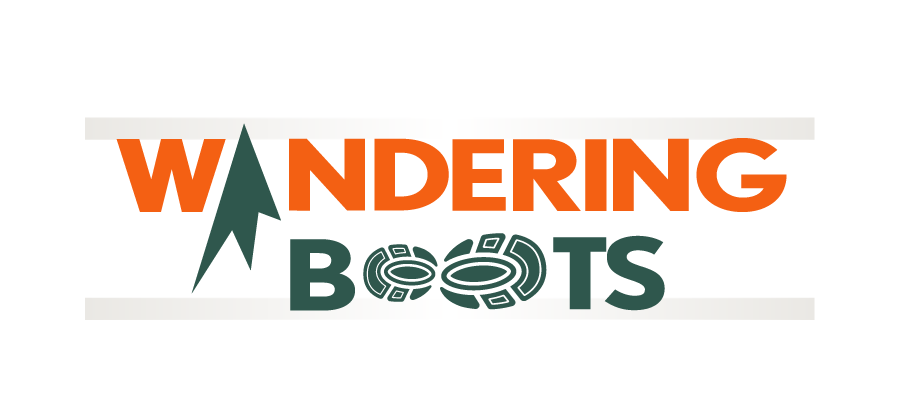
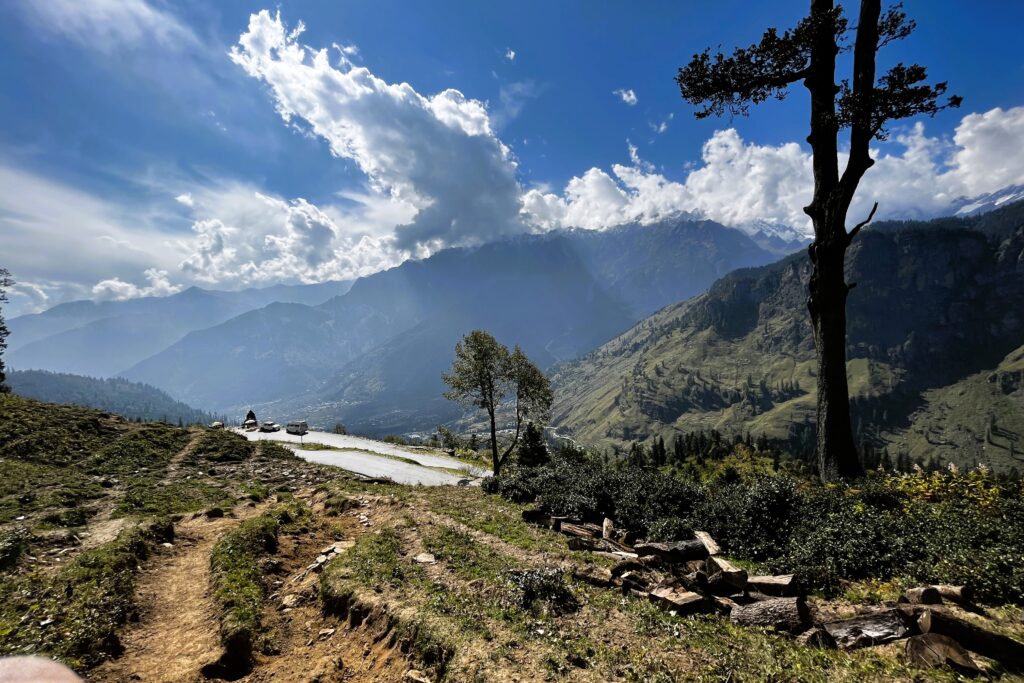
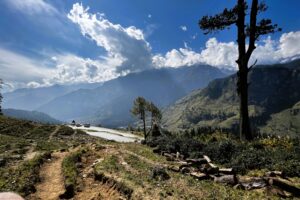
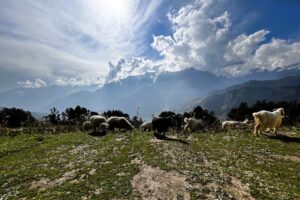
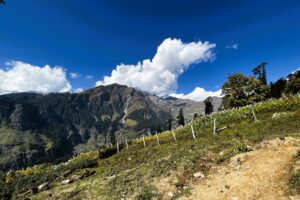

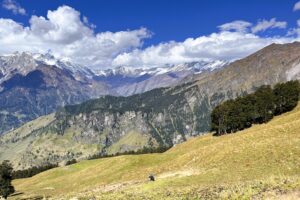
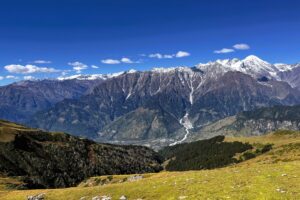
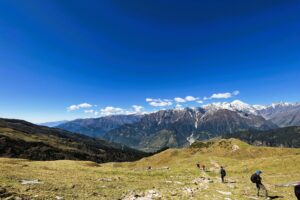
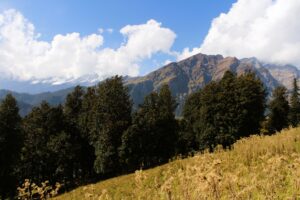
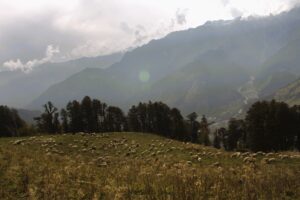

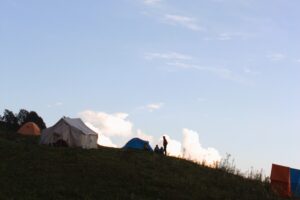
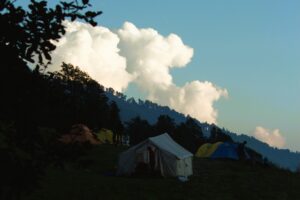
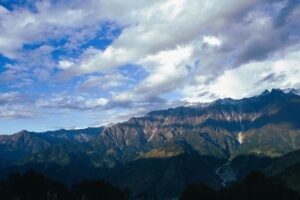
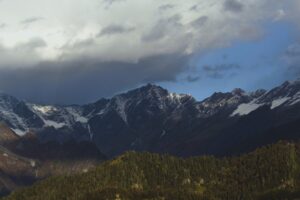
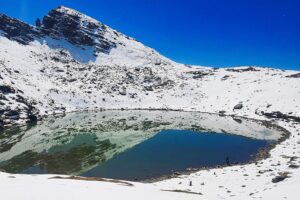
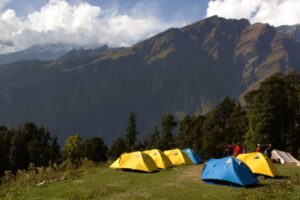
There are no reviews yet.